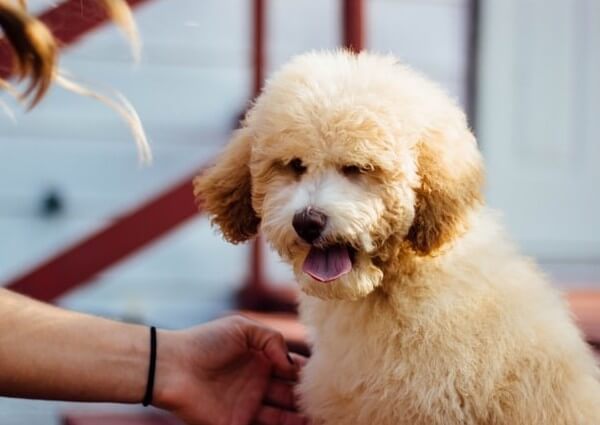
Are Merle Poodles different from other Poodles? Not quite. What makes Merle Poodles unique from other Poodle dogs is their coat pattern. The only difference is that these Poodles have a dominant Merle gene.
In this article, we’ll discuss everything you need to know about the Merle Poodle, including their physical appearance, temperament, and health issues. We’ll touch on the differences between Merle coat and parti / brindle coats. We’ll also cover the different Merle Poodle sizes and explore the Blue Merle Poodles, one of the most popular Merle Poodles in town.
Let’s begin!
Table of Contents
What is a Merle Poodle?

Mesmerizing and mystical, Merle Poodles are famous for their unique coat patterns. These patterns result from a rare semi-dominant gene called Merle.
As for kennel clubs like the UKC and AKC, Merle Poodle is not eligible for registration. Merle gene in Poodles is considered a fault, which is why you cannot get your Merle Poodle AKC or UKC registered or feature them in their dog shows.
Merle Poodles are also a subject of controversy. That’s because these pups are prone to several congenital health issues, and the breeding practices that produce these lovely canines aren’t always ethical.
Can Poodles be Merle?
Yes, Poodles can be Merle. If you’re wondering, “do Poodles come in Merle?” the answer is no; Poodles are never naturally Merle. The only way a Poodle can be Merle is if one of their ancestors bred with a natural merle canine like the Australian Shepherd, the Border Collie, or the Shetland Sheepdog.
Merle Poodle genetics

Merle is a dominant gene, meaning that a puppy only needs to inherit the gene from one parent to have the Merle coat pattern.
If both pup parents carry the Merle gene, the resultant offspring is called a double Merle. These pups suffer from congenital blindness and deafness, which is why no breeder should mate two Merle Poodles together.
Merle alters the eumelanin pigment in canines. Eumelanin is responsible for black coloration, and the Merle gene causes patchy dilution or discoloration on the skin.
Merle Poodle physical appearance
Other than their unique coat pattern, Merle Poodles look just like any other Poodle. However, their eyes aren’t always dark brown, and you can find Merle Poodles with blue or partially blue eyes. Merle Poodles can also have blue or pink noses due to the lack of pigmentation.
You may be interested in: Dogs With Pink Noses
Are Merle Poodles purebred?
The prevalent theory behind Merle Poodles is that they result from partnering Australian Shepherds with Poodles. This means any Merle Poodle you see is crossbred.
Merle vs parti Poodle
Parti poodles have a white base coat with patches of another color — usually black, brown, or red.
Merle Poodles have a dark coat with patches fading or dilution of varying degrees. The patches on Merle Poodles seem to blend into each other, whereas those on a particolored Poodle have distinct borders.
Some breeders have experimented with Merle Poodles in different coat patterns. One result is the Parti Merle Poodle.
These Poodles have the characteristic white base of a Parti Poodle, but the dark patches on their skin carry a Merle pattern. Depending on the spot color of the parti Poodle parent, a Merle parti Poodle can have intriguing coat patterns.
Parti Merle Poodle colors
| Parti color | Parti merle colors |
| Black and white | Black, blue, grey on white |
| Brown and white | Dark and light brown on white |
| Red and white | Chocolate, red, and cream on white |
Merle vs brindle
Brindle is when a Poodle’s coat has dark streaks on a lighter base coat. Unlike Merle — which appears in patches— brindle resembles tiger-like vertical stripes.
The genetics of brindle is also different from Merle. Merle is semi-dominant, whereas brindle is a recessive gene.
Merle Poodle colors
Merle isn’t exactly a coat color; it’s a pattern. Since the Merle gene can affect the black hair on any coat color, Merle Poodles come in several unique and marvelous shades.
Let’s discuss some of them.
You might like: F1B Bernedoodle (Complete Guide)
Blue Merle Poodle
Perhaps the most famous Merle Poodle is the Poodle blue Merle. It’s a highly valued coat color, with some going for as high as $15,000.
Blue Merle Poodles come in all Poodle sizes. Whether you want a blue Merle mini Poodle, blue Merle toy Poodle, or blue Merle standard Poodle, you can get one if you have deep enough pockets.
Blue Merle Poodle blue eyes
The blue Merle Poodle can have blue eyes instead of the regular black or dark brown. This blue can have different shades. They can also have heterochromatic eyes, meaning one eye may have a different color from the other eye.
Blue Merle Poodle mix
As we’ve mentioned above, Merle Poodles aren’t pure Poodles. Some breeders have bred them with Border Collies to make blue Merle Border Collie Poodle mix to have Poodles with a Merle coat. This Merle Poodle mix is one of the many “doodles” or poodle mixes.
Chocolate Merle Poodle
Chocolate Poodles have a dilution gene that doesn’t just change the coat color but also their nose, paw pads, and lips to brown. It doesn’t matter which color dominates the coat as long as the nose, paw pads, lips, and eye rims are brown.
A Chocolate Merle standard Poodle is a chocolate Poodle in the standard size of 15 to 24 inches. The Chocolate Merle Miniature Poodle or Chocolate Merle mini Poodle is smaller than the standard Poodle, and the Chocolate Merle toy Poodle is the smallest of them all.
Phantom Merle Poodle
Phantom Merle is when you have a Poodle with very little or no Merle markings. It can sometimes be impossible to tell whether you have a phantom Merle standard Poodle unless you get her DNA tested. Another name for the phantom Merle Poodle is cryptic Merle Poodle.
SEE ALSO: Phantom Poodle (Complete Guide)
Red Merle Poodle
Red Poodles have a vibrant brown coat. When red Poodles carry the Merle gene, they get the red Merle coat. Red Merles usually have brown noses, paw pads, lips, and eye rims.
Red Merles cost higher due to their rarity and the breeding expertise involved in producing them. Size is also a factor in determining their price, and a red Merle toy Poodle is pricier than a red Merle standard Poodle.
Check Out: Red Goldendoodle – Complete Guide
Black Merle Poodle
A black Merle Poodle has a predominantly black coat with some blue and grey coloring. When the Merle gene doesn’t express itself dominantly, the black stays black on most parts of the Poodle’s body. Black Merle Poodles can have blue eyes.
Sable Merle Poodle
Sable is a fascinating coat color in which the Poodle has dark-tipped hair on a light base coat. In sable Merle Poodles, those dark-tipped hair are affected by the Merle gene and appear randomly faded.
Silver Merle Poodle
Silver is similar to blue Merle in terms of the overall look. The darkest color on their coat is dark grey, and it dilutes to silver and white at some places.
Brown Merle standard Poodle
Similar to how the Merle gene on a black Poodle gives them the white, silver, blue, and black fur, the Merle gene on a brown Poodle gives them the dark brown, light brown, cream, or white fur.
A brown Merle standard Poodle is a standard-sized Poodle with a brown Merle coat.
You might also like: F2B Goldendoodle – Complete Guide
Cryptic Merle Poodle: Have you ever heard of this dog?
Cryptic Merle Poodles are Poodles who secretly carry the Merle gene, meaning they don’t look like Merle Poodles. Cryptic Merles look like regular Poodles and can have any coat color, but breeding them with Merle Poodles will result in double Merles.
Cryptic Merle Poodles are also called Phantom Merle Poodles.
Do Merle Poodles change color as they grow older?
While your Merle pup may show more grey hair as it grows older, Merle Poodles stay Merle all their lives. While other Poodles change their coat color as they grow, Merle Poodles are safe from age-related color dilution.
Merle Poodle size, height, and weight
Merle Poodles come in three conventional sizes: standard, miniature, and toy. Sometimes, there’s also a medium-size category that describes a Poodle between standard and miniature sizes.
Another size type is the Merle teacup Poodle, which includes extra-small Poodles.
Here’s how they all stack up.
Merle Poodle Sizes
| Standard | Mini | Toy | Teacup | |
| Size group | Medium-large | Small | Small | Small/teacup |
| Height | 15-24 inches | 10-15 inches | 9-11 inches | Below 9 inches |
| Weight | 40-70 pounds | 10-20 pounds | 6-9 pounds | Under 6 pounds |
Merle mini Poodle
Like all Poodles, Merle Poodles also come in miniature (mini) size. Mini Merle Poodles are 10 to 15 inches tall and weigh around 10 to 20 pounds.
Merle standard Poodle
The standard Merle Poodle is the largest Poodle size. These pups weigh over 40 pounds and fall in the medium to large dog category.
Merle toy Poodle
A toy Poodle merle is the smallest official Poodle breed. These furballs stand a mere 9 to 11 inches and weigh under 10 pounds. Some breeders also provide Merle toy Poodle stud service if you want your female Poodle to have toy-sized Merle puppies.
Merle teacup Poodle
A Merle teacup Poodle is miniaturization taken to the extreme. These pups grow no bigger than 9 inches. Teacup isn’t an official Poodle size, and a Merle teacup Poodle is what the tiniest pup in a litter of toy Poodles is called.
Ethical breeders advise against such extreme miniaturization, which is why you would never see them using the “teacup” name to describe their pups.
Merle Poodle temperament and personality
Merle Poodles are pretty much the same as any other Poodle. They are friendly, intelligent, and make great family pets. Merle Poodles are a bit sensitive about being left alone. These pups love human company and interacting with people or other canines. They can also be quite talkative.
Does Merle Poodle get along with other pets?
Yes, Merle Poodles do get along with other pets. If Merle Poodles get early socialization training, they get along well with other pets. Just be careful leaving them with bigger or unfamiliar dogs. Merle Poodles can be talkative, which may annoy certain other canines.
Does Merle Poodle make great family pets?
Yes, Merle Poodles do make great family pets. Merle Poodles love being with their family and make great companions for kids. These pups can adapt well to many living conditions, including smaller homes or apartments.
However, Merle Poodles with vision or hearing issues need special care. As such, they won’t suit households with very young kids.
Merle Poodle training
Training your Merle Poodle is the same as training any other dog. Thanks to their intelligence and cooperative nature, they are relatively easy to train. You’ll just have to make sure you start early and use positive reinforcement methods.
Merle Poodles with hearing or vision disabilities would need a different training approach. You’ll need to be more patient and consistent with them and use hand signals or verbal cues instead of relying on commands that may go unnoticed.
Merle Poodle exercise requirement
Merle Poodles love playing, but they don’t need a lot of exercise. They can get moderate activity indoors and are happy playing in the house. Once again, you have to consider your Merle Poodle’s disabilities. If you have a deaf or blind Poodle, you’d need to choose her physical activities accordingly.
Merle Poodle grooming and cleaning
The coat of your Merle Poodle requires daily brushing at the very least. They shed seasonally, so you’ll need to brush them more often during the spring and fall seasons.
Merle Poodles preparing for beauty shows need more frequent baths; otherwise, you should bathe your Merle Poodle only when she is dirty or stinky.
Be sure to use dog-friendly shampoos since human shampoos can be harsh on our dog’s skin and coat. Doggy shampoo cleanses our dogs without stripping the natural oil and moisture from their skin and coat.
Is the Merle Poodle hypoallergenic?
Yes, Merle Poodles are hypoallergenic dogs. Merle Poodles have curly hair that catches loose fur before they fall. This means they don’t leave their hair everywhere. Merle Poodles also don’t produce as much dander like other dogs, so they are perfectly suited for people with allergies.
Merle Poodle food and diet
As with all canines, Merle Poodles need a balanced and healthy diet. They need a good amount of protein, carbohydrates, and micronutrients in their meals to keep them at their best.
Merle Poodles are prone to obesity if they eat table scraps or human snacks. You’ll need to keep an eye on their food intake and make sure you’re giving them the correct portions.
Merle Poodle health issues
Like other dogs, Merle Poodles are prone to some health problems. The Merle gene also contributes to the pup’s overall health, giving them a higher chance of congenital diseases.
If you have a double Merle Poodle, the odds are even worse. Some health risks associated with Merle Poodles are:
1. Congenital blindness and deafness
Merle canines, especially those with the double Merle gene, are prone to congenital blindness and deafness. Double Merles can also be born with missing or malformed eyes or ears.
2. MDR1 mutation
MDR1 mutation isn’t a disease but a sensitivity. Merle pups are highly sensitive to Ivermectin, a substance present in common animal deworming medicines. Ingesting any substance (including animal feces) containing Ivermectin can harm your Merle Poodle.
3. Addison’s disease
Addison’s disease is a hormonal disorder that results in the underproduction of cortisol by the adrenal gland. This can lead to weakness, dehydration, and changes in appetite and body weight.
4. Progressive Retinal Atrophy or PRA
Progressive Retinal Atrophy (PRA) is an inherited disease that causes blindness. It typically starts with night blindness and eventually progresses to total blindness. Merle Poodles are more prone to it because their eyes lack the melanin protection.
5. Bloat
Bloat is a life-threatening swelling of the belly due to gas. It can sometimes lead to gastric torsion in which the stomach twists, cutting off its blood supply. This condition can be fatal.
6. Hyperthyroidism
Hyperthyroidism is when the thyroid gland produces thyroid hormone excessively. This can lead to weight loss, increased heart rate, loss of appetite, panting, and a host of other problems.
Merle Poodle lifespan
Merle Poodles have a pretty good lifespan of 10 to 18 years. However, that can vary depending on their genetic health and the presence of any hearing or eyesight issues.
Merle Poodle breeders
If you’re interested in getting a Merle Poodle, make sure to find reputable breeders. However, this can be difficult, considering most legitimate breeders avoid breeding Merle pups.
Although breeding Merle Poodles is not strictly illegal, breeding double Merles is highly unethical. No reputable breeder would do that because it puts the pups at risk of health issues.
Tips to know when buying a Merle Poodle
Here are some tips to follow before bringing a Merle Poodle home.
- Check the pup’s health records and verify that both parents are free of genetic health issues.
- Ensure the pup is not a double Merle. You can do this by meeting the pup’s parents in person.
- If the parents have any hearing and/or eyesight issues, then chances are they’ll pass it on to their offspring.
- Make sure the breeder tests their pups for health conditions that affect Merles.
- If possible, ask for genetic screening. It will reveal whether or not the pup is a double Merle.
Merle Poodle puppies
After getting a Merle Poodle puppy, the first thing to do is get a medical check-up. Make sure to verify their health and have a vet test them for any congenital issues. You’ll also want your Merle Poodle pup to get his or her required vaccinations.
You should also ask the vet about your pup’s eating requirements. This is crucial because Merle standard Poodle puppies have a different dietary need than Merle toy Poodle puppies.
If this is your first time owning a Merle Poodle puppy, you may not know for sure how big your pup will grow.
Merle Poodle price
Merle Poodles routinely cost around $3,000 to $6,000. That’s significantly higher than any regular Poodle. Unfortunately, the high price is often why breeders adopt unethical breeding practices to produce more pups in that color.
Merle Poodle for sale
Due to their high price, finding a Merle Poodle for sale can be difficult. However, if you’re persistent enough in your search, you might find one on the internet. Just follow the tips we mentioned above before making any purchase.
Merle Poodle puppies for sale
The price of Merle Poodle puppies depends on their size, color, parentage, and health. Your priority should be to purchase a healthy pup, so you need to find an ethical breeder that screens their puppies for diseases and genetic defects. As long as you get health guarantees, the price shouldn’t matter.
You can find Merle standard Poodle puppies for sale online, but make sure to follow the tips mentioned above before buying one.
Blue Merle Poodle puppies for sale
Blue Merle is the most popular Merle color amongst Poodles. They can be steeply overpriced, and you can find blue Merle standard Poodle puppies for sale for as much as $15,000.
However, their rarity justifies the premium rates. You’ll come across some blue Merle toy Poodle puppies for sale at even higher prices.
Is the Merle Poodle right for me?
A Merle Poodle isn’t for everyone, but they are beautiful dogs. If you can handle the high price, then make sure to do your research and find a reputable breeder.
However, this breed comes with several health concerns that potential owners should know before making the purchase.
DISCLAIMER: THIS WEBSITE DOES NOT PROVIDE MEDICAL ADVICE
The information, including but not limited to, text, graphics, images and other material contained on this website are for informational purposes only. No material on this site is intended to be a substitute for professional veterinary advice, diagnosis, or treatment. Always seek the advice of your veterinarian or other qualified health care provider with any questions you may have regarding a medical condition.
Resources:
https://en.wikipedia.org/wiki/Merle_(dog_coat)
https://www.britannica.com/animal/poodle

With over five years of specialized experience as an animal writer, my expertise lies in dog nutrition, health, behavior, grooming, and training. I am dedicated to delivering helpful and informative content that caters to the well-being of our furry friends. My primary goal is to empower pet owners with knowledge and ensure our canine companions thrive in health and happiness. In my free time, I love volunteering at local dog rescue centers.







